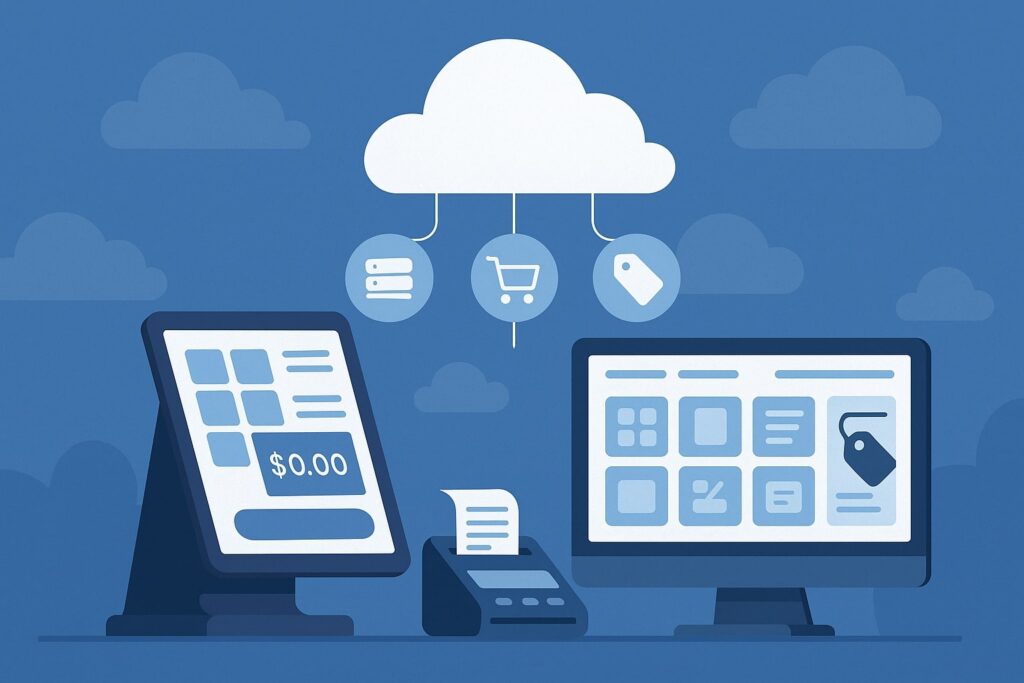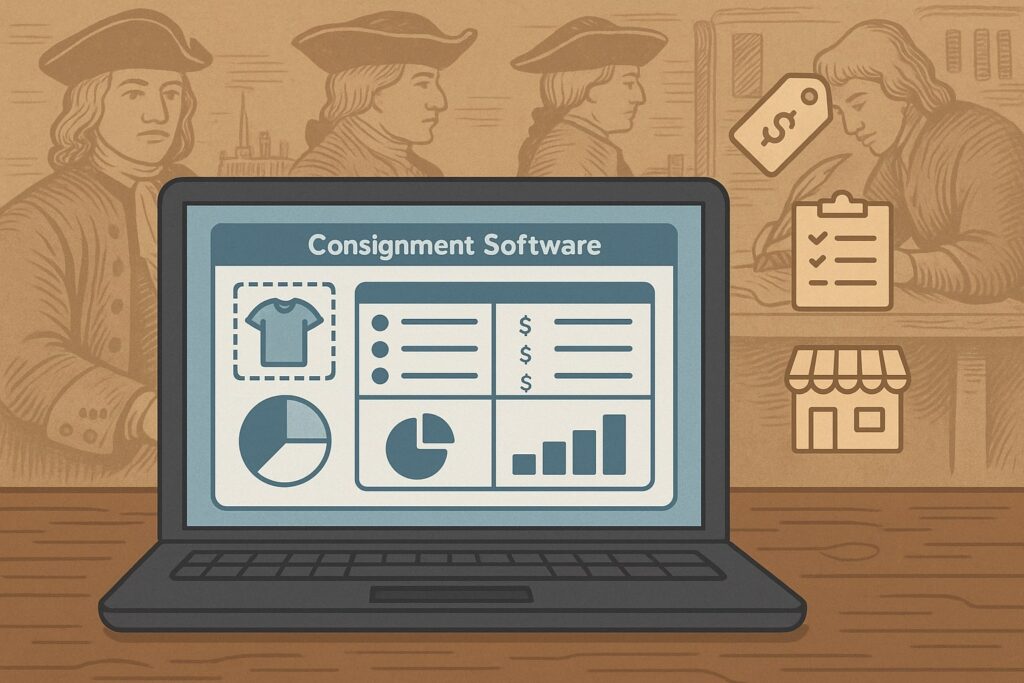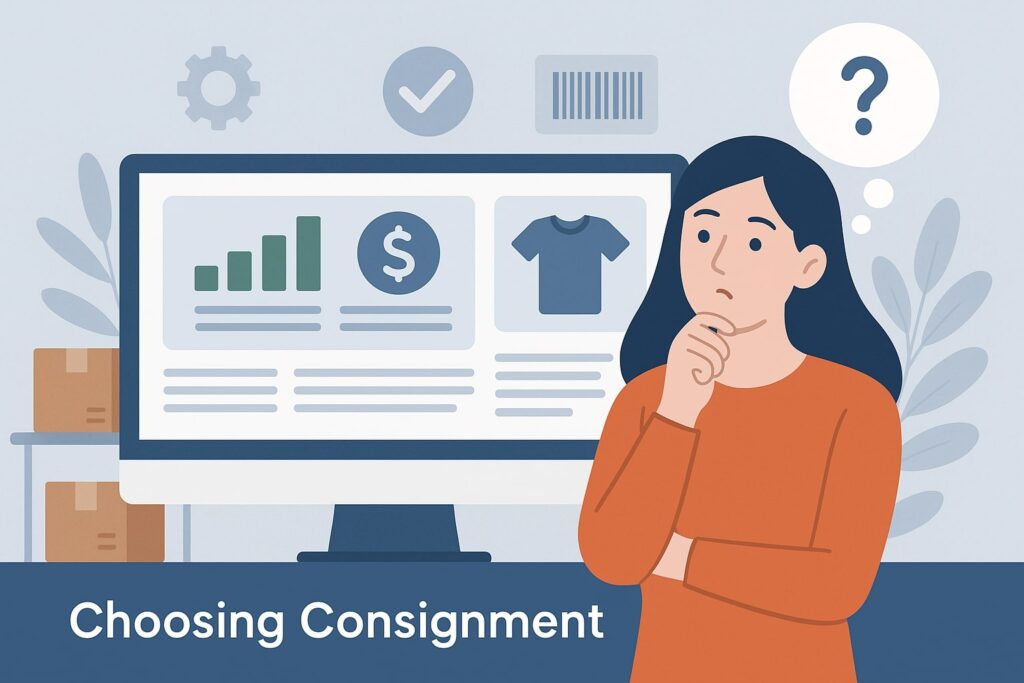
By consignmentpos September 13, 2025
Consignment shops and resale boutiques need systems to track inventory, consignors, and payouts. Running a consignment store means juggling inventory and handling vendor commissions.
Modern POS and consignment software streamline sales tracking, inventory management, and consignor payouts. Solutions range from cloud-based platforms (Shopify, Square, Lightspeed) to dedicated consignment systems (Ricochet, ConsignCloud, SimpleConsign) and legacy desktop programs (ConsignPro, RetailEdge).
This comparison examines key features, pricing, and best use cases so store owners can choose the right platform.
Cloud-Based POS & Consignment Platforms

Cloud POS platforms are popular for their accessibility and ease-of-use. They keep data online, offer mobile apps, and integrate with e-commerce. Below are major cloud options that consignment stores often use:
- Shopify POS: Shopify is primarily an e-commerce platform, but its POS system integrates online and in-store sales. Shopify’s basic POS (Lite) comes with any Shopify plan (starting at $39/month).
Upgrading to Shopify POS Pro (around $89/month per location) unlocks advanced inventory tools, customer insights, and omnichannel features. Shopify supports many apps, including consignment-specific ones (e.g. Circle-Hand) that sync inventory across channels and manage consignor payouts.
Pros: strong online store integration, large app ecosystem, mobile and hardware support.
Cons: higher monthly fees and transaction rates (2.7–2.9% in-person, +30¢ online on basic plan), limited offline mode, and no native vendor-split features (requires add-ons). - Square for Retail: Square’s cloud POS is free for basic use and designed for small businesses. It offers unlimited products/employees and basic inventory, with flat transaction fees (typically 2.6% + 15¢ for in-person).
Consignment stores can add the Square for Retail plan ($89/mo per location) to gain vendor management, purchase ordering, and advanced inventory. Square is praised for its straightforward pricing (no monthly cost for the free tier) and ease of use.
However, Square lacks built-in consignor portals and commission splits; many sellers rely on integrations or third-party apps (e.g. Rose or Consignor) to handle payouts.
Pros: minimal upfront cost, user-friendly interface, multi-channel support (Square Online).
Cons: advanced consignment features require paid add-ons, and hardware can add expense. - Lightspeed (Retail): Lightspeed is a mature cloud POS known for deep inventory and multi-location features. The R-Series of Lightspeed Retail offers comprehensive tools (item matrix, purchase orders, advanced reporting, multi-store sync) but at a higher price and complexity.
Lightspeed is often recommended for larger or multi-location consignment shops needing high-volume inventory management. For example, TechAdvice notes Lightspeed “powers store growth with bulk item management and automated orders,” though it can be overkill for small boutiques.
Lightspeed integrates with accounting and e-commerce, but users should be prepared for a steeper learning curve and contracts. - Specialized Cloud Consignment Software: These are cloud platforms built expressly for consignment/resale. Examples include:
- ConsignCloud: A consignment-centric POS with customizable features. Pricing tiers start at $119/mo (basic) up to $179/mo (enterprise). It includes unlimited consignors, reporting, and even multi-location add-ons. Users praise its flexibility and consignor portal, though it can be complex to configure.
- SimpleConsign: Formerly ConsignPro, SimpleConsign is cloud-based for consignment shops. Plans start at $159/mo (Basic) up to $359/mo (Pro).
It offers features like inventory tracking, consignor payouts, scheduling, and POS checkout. The Standard/Pro plans add consignor self-service portals and QuickBooks or Shopify integrations. - Ricochet POS (formerly BestConsignmentSoftware): A Windows/cloud hybrid POS. Ricochet charges about $159/mo or $1599/yr. It provides consignment features (vendor splits, barcoding, e-commerce integration) and optional web storefront.
- CirQit (ConsignR): A newer platform (marketed as ConsignR) that integrates with Shopify. ConsignR automates consignor payouts, item management, and offers a seller portal. (Pricing is subscription-based; details vary per store size.)
- Circle-Hand (Shopify App): Not a stand-alone POS but a Shopify app providing consignment add-ons. It syncs Shopify and POS inventory, manages vendor accounts, and automates commissions. Plans start around $99/mo and up by sales volume.
- ConsignCloud: A consignment-centric POS with customizable features. Pricing tiers start at $119/mo (basic) up to $179/mo (enterprise). It includes unlimited consignors, reporting, and even multi-location add-ons. Users praise its flexibility and consignor portal, though it can be complex to configure.
Desktop/Historical Consignment Software

Some shops still use desktop or on-premise systems, often with one-time licensing instead of monthly fees:
- ConsignPro (SimpleConsign): A Windows-based consignment POS with decades of use. ConsignPro traditionally sold perpetual licenses (around $795 for a network copy). It also offered a lease ($129/mo per location).
Recently ConsignPro has partnered with SimpleConsign to move shops to the cloud. Core features include detailed item tracking, consignor accounts, and full check-printing for payouts. - RetailEdge: A Windows POS with consignment features. It tracks consignor info, applies consignment pricing rules, and connects to QuickBooks if needed.
RetailEdge is sold as a perpetual license (~$495 for the software). Users mention built-in consignment/vendor management and easy QuickBooks exporting for payouts. - Best Consignment Software: (Also called “Computer Peeps BestConsignmentShopSoftware”) A simple Windows consignment program.
It offers lifetime licensing (e.g. $395 one-time for the Deluxe edition). Features include item entry, ticket printing, and consignment splits. It has minimal ongoing fees, but lacks cloud/mobile features. - Liberty4 Consign / REACT (Resaleworld): A popular resale and consignment desktop system often bundled by Resaleworld. Resellers offer Liberty packages with financing (e.g. hardware + software for ~$99/mo).
It includes consignment tracking, consignor center, and retail features. Liberty REACT can run locally or via Resaleworld’s cloud service. - BreezeConsign: (For QuickBooks) – A simpler add-on for QuickBooks, often used by small sellers for ticketing/payouts. It’s low-cost (around $20/mo with QuickBooks) but with limited features.
Feature-by-Feature Comparison
When choosing software, key consignment features to compare include vendor/consignor management, inventory tracking, e-commerce integration, reporting, multi-store support, and hardware compatibility. The table below summarizes how each platform stacks up:
| Software | Type | Consignor/Vendor Management | Multi-Channel/E-Commerce | Inventory Control | Reporting | Platforms/OS |
|---|---|---|---|---|---|---|
| Shopify POS | Cloud/POS | Via Apps (Circle-Hand, etc) | Strong (online store) | Unlimited inventory, barcoding | Basic with add-ons | Web, iOS, Android |
| Square POS | Cloud/POS | Basic (with paid add-ons) | Yes (Square Online) | Basic inventory, low-stock alerts | Standard reporting | Web, iOS, Android |
| Lightspeed Retail | Cloud/POS | No built-in consignor portal | Yes, multi-channel | Advanced (bulk upload, composites) | Advanced reporting | Web, iOS |
| ConsignCloud | Cloud/POS | Yes (consignor portal, payouts) | Basic (integrations) | Advanced (serials, orders) | Customizable analytics | Web (any device) |
| SimpleConsign | Cloud/POS | Yes (vendor splits, ACH payouts) | No built-in online sales (uses Shopify add-on) | Advanced (scheduling, buyouts) | Consign-specific reports | Web (any device) |
| Ricochet POS | Cloud/Hybrid | Yes (vendor splits) | Some (built-in ecommerce) | Advanced (lot/serials) | Good (CSV export) | Web/Windows |
| ConsignPro | Desktop/PC | Yes (vendor handling) | No | Advanced (matrix, custom tags) | Decent (templates) | Windows |
| RetailEdge | Desktop/PC | Yes (vendor tracking, pay-outs) | No | Standard (UPC/consignments) | Good (QuickBooks sync) | Windows |
| Liberty REACT/Cloud | Desktop/Cloud | Yes (real-time consignor portal) | Yes (Shopify, eBay integration) | Advanced (auto-tagging) | Good | Windows, Web |
| Best Consignment S/W | Desktop/PC | Yes (basic splits) | No | Standard (labels, barcodes) | Basic | Windows |
- Shopify has built-in inventory and checkout for in-person sales, and connects natively with its online store. However, true consignor management (vendor splits, auto-payouts) requires additional apps.
- Square excels at simple setup: free software and reader, quick onboarding, and can list items online via Square’s e-commerce. Its “for Retail” plan adds some consignment tools (vendor mgmt, POs), but it has no automated consignment payout engine without a partner app.
- Lightspeed offers enterprise-grade inventory (e.g. matrix items, bulk ordering) and 24/7 support. It is often recommended for multi-store or large consignment operations, though it does not focus exclusively on consignment splits.
- ConsignCloud and SimpleConsign were built for consignment: they include consignor account portals, automated check runs/ACH, and vendor-level tracking. ConsignCloud especially touts its scalability and analytics. These systems generally lack built-in e-commerce (many use Shopify integration) but excel in core consignment workflows.
- Ricochet (formerly “Best Consignment S/W”) provides a full POS with a one-time license or cloud option. It handles consignments and can publish to a simple online store.
- Desktop solutions like ConsignPro and RetailEdge can be cost-effective one-time purchases, and cover all consignment basics (tracking sellers, customizing splits, printing tags). However, they lack cloud convenience and modern e-commerce, and updates may require extra fees.
- Liberty (Resaleworld) is a hybrid that supports both on-site and cloud; many retailers finance it (e.g. $99/mo bundles). It includes POS and consignor features, and can integrate with Shopify or Amazon for online sales.
Pricing Comparison
Budget is a big factor. The table below outlines the starting costs (note: pricing may vary by store size and bundle):
| Software | Cloud/Desktop | Starting Price (per location) |
|---|---|---|
| Square POS | Cloud | Free base plan (2.6%+15¢ fee) |
| Square for Retail | Cloud | $89/mo (per store) |
| Shopify POS Lite | Cloud | Included (Shopify Basic $39/mo) |
| Shopify POS Pro | Cloud | $89/mo (per store) |
| Lightspeed Retail | Cloud | Starts ~$89–$179/mo (tiered plans) |
| ConsignCloud | Cloud | $119/mo (basic) |
| SimpleConsign | Cloud | $159/mo (basic) |
| Ricochet POS | Cloud/Hybrid | $159/mo (or $1599/yr) |
| ConsignR (Shopify) | Cloud | (Pricing on request or custom) |
| ConsignPro | Desktop | $795 (network copy, one-time) or $129/mo lease |
| RetailEdge | Desktop | $495 (one-time) |
| Liberty (REACT) | Desktop/Cloud | Approx. $99–$147/mo (financing bundles) |
| Best Consign. SW | Desktop | $395 (one-time for basic package) |
Citing examples: Square’s free plan has no monthly fee; you pay only transaction charges (2.6%+15¢ in-person). Square for Retail adds a $89/mo tier for vendors and POS. Shopify requires at least the $39 Basic plan for POS Lite; to use Shopify POS Pro features, it’s $89/mo each store.
Consignment-focused platforms charge from $119/mo (ConsignCloud) to $159/mo (SimpleConsign). Desktop programs usually involve an up-front cost (e.g. RetailEdge $495, ConsignPro $795) or a lease ($129/mo for ConsignPro).
Key Features in Detail
- Vendor/Consignor Management: Critical for consignment. Platforms should track each consignor’s items, commission percentages, and payout status. Square and Shopify do not include this natively; consignment shops using them typically add a separate system.
In contrast, ConsignCloud and SimpleConsign have built-in consignor portals and automate splits. RetailEdge and ConsignPro (desktop) also manage vendor info directly. - Inventory Tracking: All systems handle inventory, but differences matter. Shopify/Square cover basic stock levels. Lightspeed and specialized software support variants, bundles, and multi-location stock.
SimpleConsign and ConsignCloud record item attributes, consignor info, and allow special pricing rules (e.g. consignment vs retail price).
Most platforms support barcode scanning and label printing. Circle-Hand syncs inventory in real time between Shopify’s online store and store POS, preventing overselling. - Reporting: General POS platforms offer sales/inventory reports; consignment platforms should report per consignor sales and due payouts. Square and Shopify require manual work or apps to calculate consignor balances.
Specialized systems (SimpleConsign, ConsignCloud) produce end-of-period sales reports per vendor and payment summaries. RetailEdge exports data to QuickBooks for audit. - E-commerce Integration: For consignment, online sales are a bonus. Shopify naturally shines here (a built-in online store). Square lets you open a Square Online site for no additional subscription.
ConsignCloud/ConsignPro can feed inventory to an integrated web store or sync with platforms like Shopify/eBay (ConsignCloud offers integrations). Ricochet includes an optional web store add-on.
Desktop programs generally lack built-in online sales, though some (RetailEdge) can interface with third-party cart tools. - Hardware Compatibility: Cloud POS works on tablets/phones. Shopify works on iPad or phone; Square on any device with the Square app and reader. Legacy software usually requires a PC (Windows) at the register.
Most systems can print to standard receipt printers and use barcode scanners. Mobile card readers: Square offers a $59 mobile reader out-of-the-box, Shopify sells card reader “POS Go” device, while desktop solutions often integrate with generic USB card terminals.
Choosing the Right Software

There’s no one-size-fits-all: selection depends on store size, budget, and priorities:
- Small shops or pop-ups: Square’s free POS or Shopify Basic can work as a cash register; pair them with a low-cost consignment app as needed. Square is great for tight budgets and beginners.
SimpleConsign’s cloud trial might suit a small boutique ready to invest in consignment-specific tools. - Online-focused consignment: Shopify stands out. If selling mainly online with occasional in-store pickup, Shopify’s unified platform and app ecosystem (including consignment apps) shine.
- High-volume or multi-location: Lightspeed Retail or ConsignCloud. Lightspeed handles thousands of SKUs and stores. ConsignCloud scales with large consignor lists and locations, with dedicated reports.
- Cost-conscious/upfront purchase: Desktop software like RetailEdge or ConsignPro avoids monthly fees, though it lacks cloud access. If you already have hardware and just need core features, a one-time purchase may be worthwhile.
Consider factors like ease-of-use (Square and Shopify are very user-friendly), consignment support (vendor portals, payouts), and integration needs.
If consignor communication and automated payouts are critical, lean on software designed for consignments. Also factor hardware: do you need mobile POS for markets/pop-ups (favors cloud systems) or just a fixed register?
FAQs
Q.1: Do Shopify or Square support consignment out of the box?
Answer: Not natively. Shopify and Square manage sales and inventory but lack built-in consignor/vendor splits. Stores typically add a consignment app or use a hybrid system to handle consignor payouts.
Q.2: What is the difference between cloud and desktop consignment software?
Answer: Cloud (web-based) software runs on any device and receives updates automatically, but requires internet. Desktop software (Windows) often has a one-time cost and can run offline, but updates may require purchases and it’s limited to that machine. Cloud solutions allow mobile access and easier e-commerce integration.
Q.3: Which software is best for a small shop on a budget?
Answer: Square’s free POS or Shopify Basic plan are good starting points, especially for in-person sales. For consignment-specific needs on a budget, SimpleConsign and ConsignCloud offer tiered pricing, while some shops use QuickBooks+add-ons or Excel for partial tracking.
Q.4: How much does consignment software typically cost?
Answer: Cloud consignment systems usually charge from about $100 to $300+ per month (e.g. $119/mo for ConsignCloud, $159 for SimpleConsign). Desktop programs may be a few hundred dollars one-time (e.g. RetailEdge $495, ConsignPro $795 license). Marketplaces like Shopify/Square charge lower monthly software fees but have transaction fees per sale.
Q.5: Can I sell consignment items online?
Answer: Yes. Shopify excels at online consignment (with the right apps), and Square offers a basic free online store. Many consignment platforms integrate with e-commerce: Shopify itself is online by nature, and tools like ConsignCloud or Liberty can link to Shopify/eBay. Desktop-only systems typically require a separate website.
Conclusion
Consignment stores have unique needs – flexible pricing and consignor management are not always built into generic POS. Shopify and Square are powerful retail platforms with large ecosystems, but they require add-ons for full consignment functionality.
Specialized consignment software (ConsignCloud, SimpleConsign, Ricochet) come with those features out-of-the-box, at higher subscription costs. Desktop programs offer a low ongoing cost but fewer modern conveniences.
Evaluate your priorities (online sales, multi-location, ease-of-use) and budget to find the best fit. By comparing features and prices, consignment store owners can select software that streamlines inventory, boosts sales, and simplifies consignor payouts.